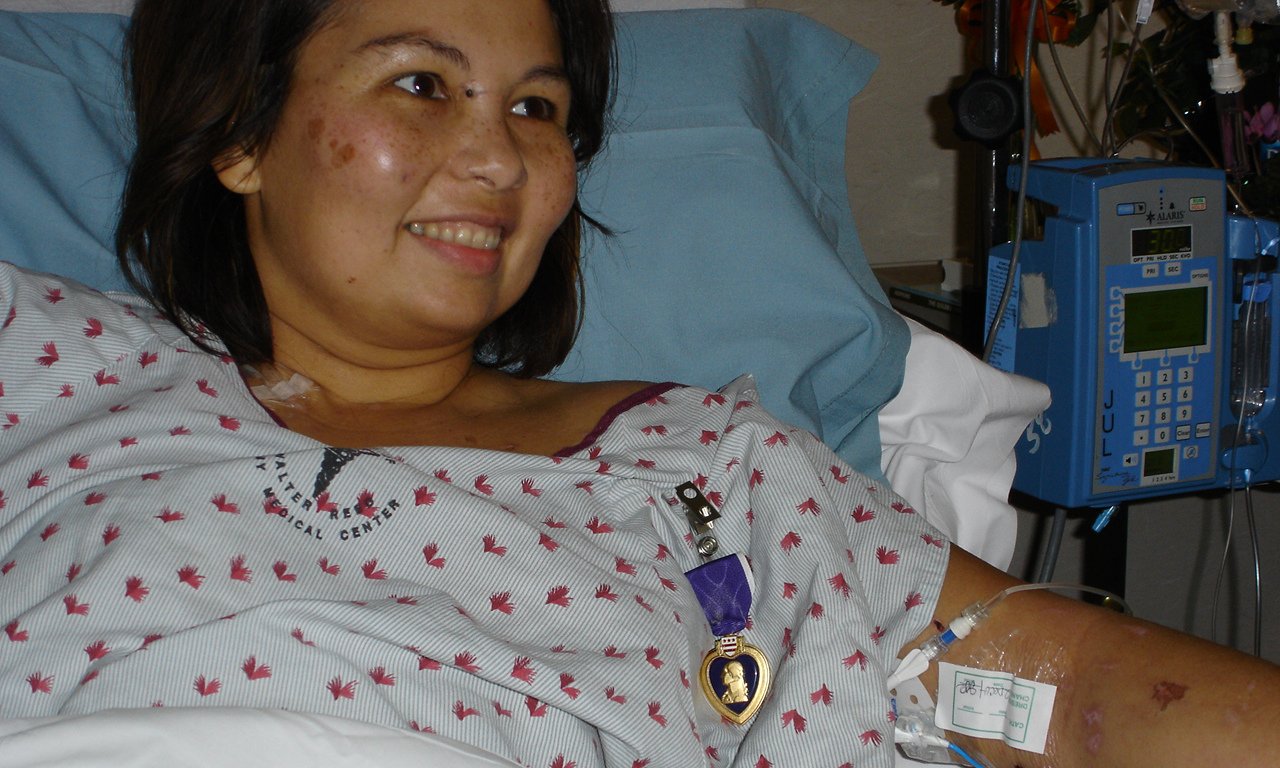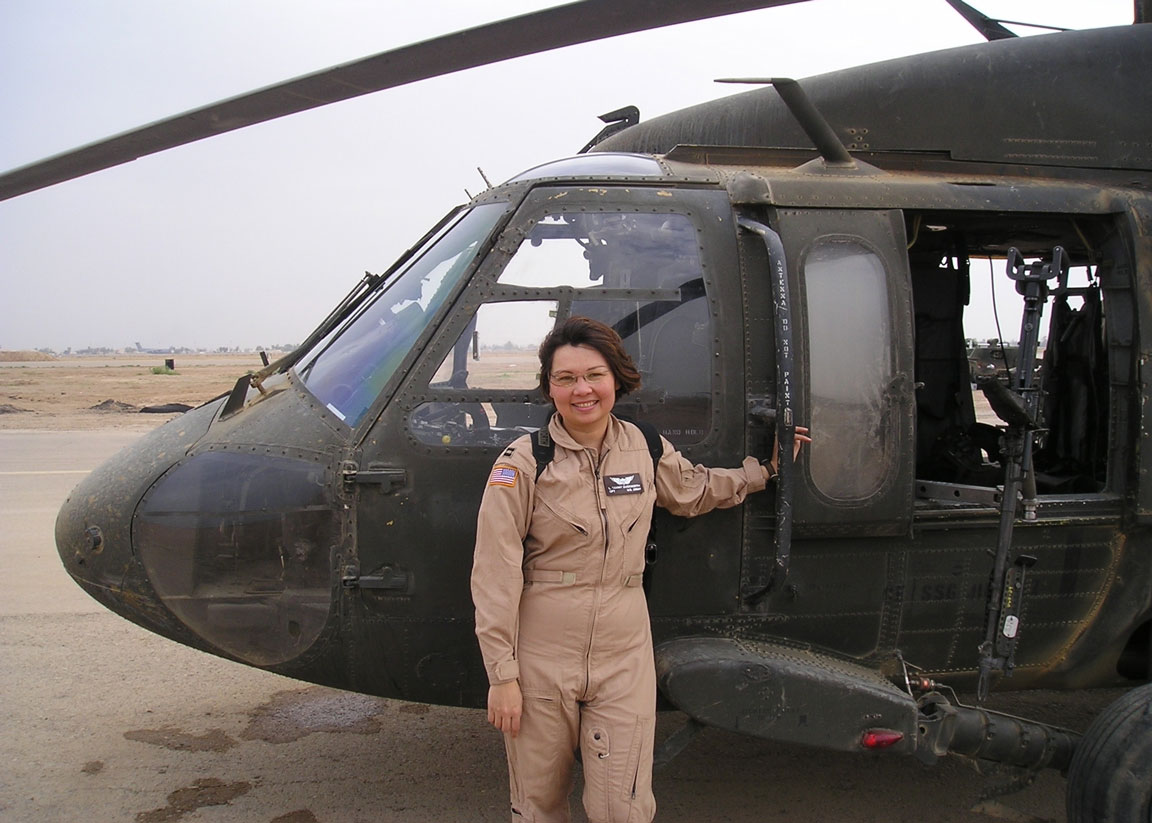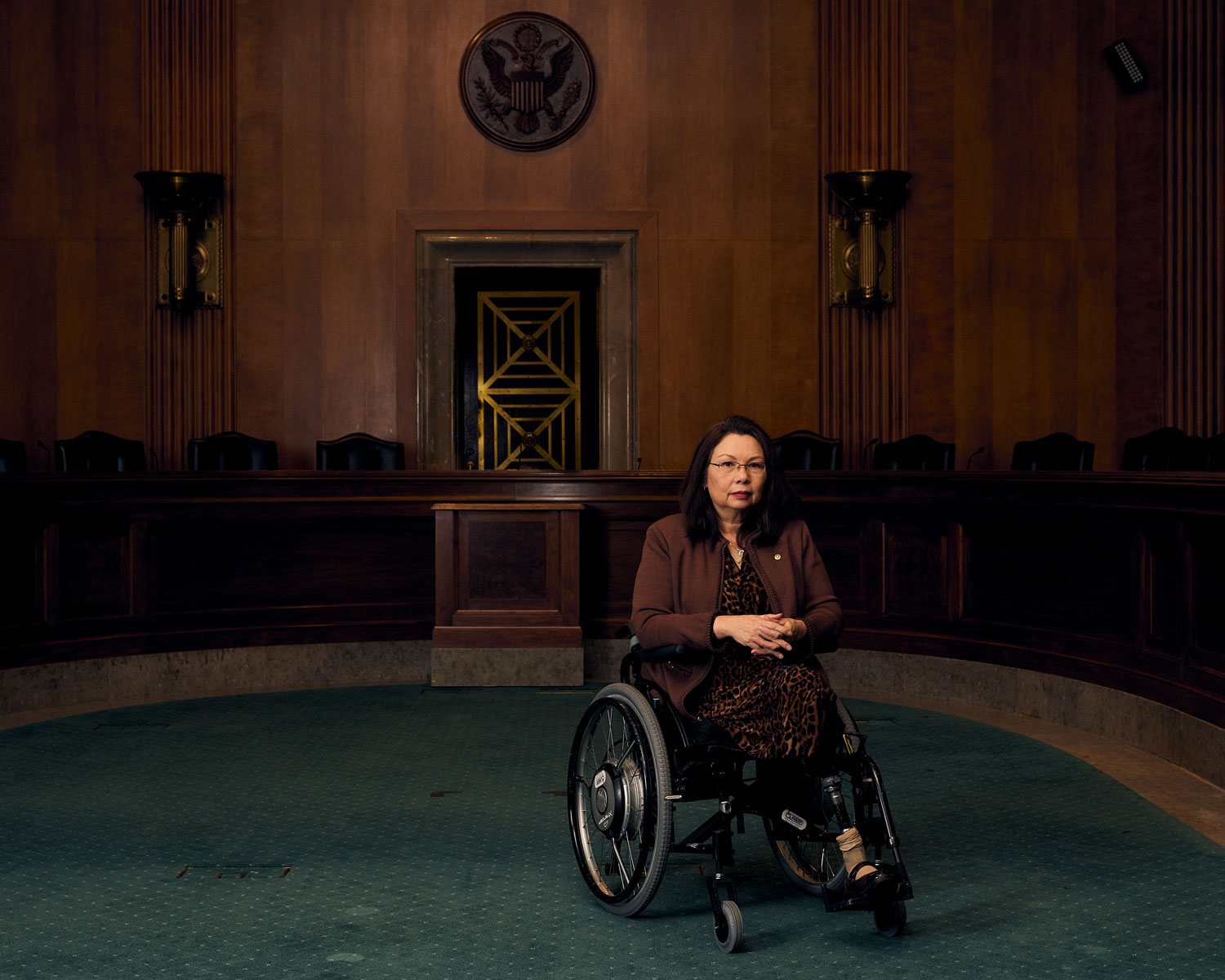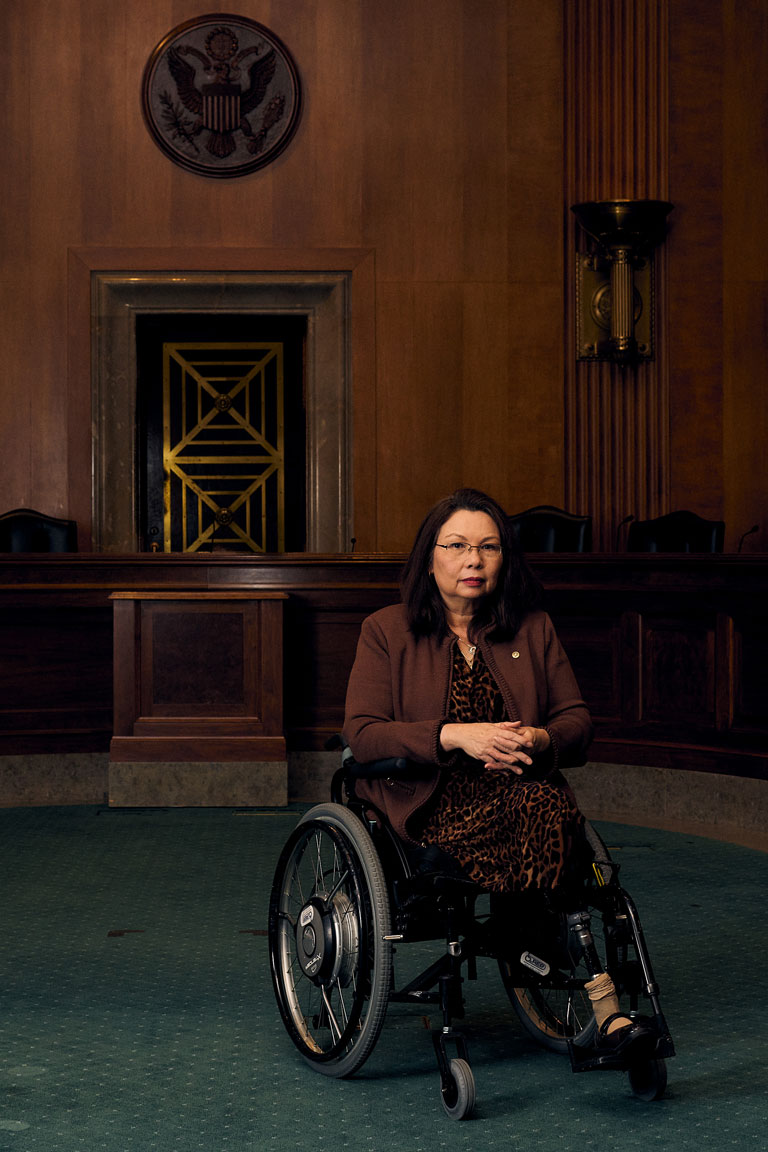When she spoke to Chicago in late March, a couple of months into the second Trump administration, U.S. Senator Tammy Duckworth was frank about her state of mind. “I’ve been having a hard time,” she said. “I keep being disappointed by people that I thought would stand up.” But disappointment does not equal resignation. The former army pilot is first and foremost a soldier, and her commitment to the so-called warrior ethos — to always placing the mission first and to never accepting defeat, quitting, or leaving a fallen comrade — greatly informs her work as a politican.
By now Duckworth’s backstory is well known. Born in Bangkok to a Thai mother and an American GI father and raised partly in Hawaii, she experienced Amerasian discrimination and economic hardship growing up. She was a doctoral student studying political science at Northern Illinois University when her National Guard unit was deployed to Iraq in 2004. When the Black Hawk helicopter she was flying was hit by a rocket-propelled grenade, she was gravely injured and lost both of her legs. Following a long and arduous recovery, she made an unsuccessful run for the U.S. House and shortly thereafter was appointed director of the Illinois Department of Veterans Affairs. Her ascent continued when she was made U.S. assistant secretary of veterans affairs under Barack Obama, then was elected to the U.S. House of Representatives in 2012 before winning her Senate seat in 2016.
Introverted by nature, Duckworth has willed herself to become an increasingly outspoken agitator, publicly challenging people and policies she believes are harming the country. When Chicago caught up with her, the Hoffman Estates resident was headed downstate to a laboratory instruments manufacturer in Moline concerned by the president’s tariffs. The senator had choice words about the Trump administration, particularly Secretary of Defense Pete Hegseth, as well as her own party’s lack of resistance. A few days later, she was back in the news, calling for the firing of Hegseth and other top officials for discussing military plans in an unsecured group chat.
Another day, another fight. “You can’t just collapse,” she told Chicago. “You’ve got to stay and fight. And so that’s what I’m doing. It’s my turn on the line.”
Here are Duckworth’s reflections, from the political to the personal, in her own words.
If somebody came up to me right now and said, “I can snap my fingers, and you’d go back to being Second Lieutenant Duckworth, you get to go to flight school and go on all those missions, you still have to get blown up and lose your legs and go through all that, would you do it again?” my answer is “Hell, yeah.” I got so much more out of my service than I ever lost. I met the best people. I got to serve my country in a way that few Americans get to do. Where in this world does a little half-Asian girl get to fly a freaking Black Hawk helicopter? I’ve flown missions over the Amazon to build hospitals. I’ve flown around the pyramids of Egypt. I got to wear the colors of this great nation and defend and protect her. Who gets to do that?
I got the ultimate gift when my buddies saved my life. I could never pay them back. But I’m going to live every day so that they’re not ashamed of me. I refuse to dishonor their sacrifices. How many people have that kind of North Star in their life?
The troops need somebody who’s qualified and knows what they’re doing in the secretary of defense position. This is the person who’s going to have to negotiate international agreements. This is the person who’s going to decide “go” and “no-go” on war decisions, on missions. [Hegseth] has been an army officer, and he knows that he’s not qualified for the [secretary] position. But he didn’t care. That’s what pissed me off more than anything else. I looked at a person who wasn’t willing to say, “You should probably put someone in the job who knows what they’re doing.” He wasn’t willing to make that sacrifice. I would never, in a million years, if I wasn’t qualified to do a mission, put myself in that position just because it was going to be good for my career. And maybe that’s what being in aviation teaches you, because the consequence is so dire and so immediate. He was putting his own personal ambitions ahead of our nation’s military. And that, to me, is a great betrayal of the truth.

My shaking at that hearing was fury. I’m naturally introverted. So the confrontational aspect takes a lot out of me. But I’m not going to not do it, because it’s about the security of the United States of America.
“[Pete Hegseth] knows that he’s not qualified. But he didn’t care. That’s what pissed me off more than anything else.”
Trump 2.0 looks different because the Republicans who would stand up to him are all gone. There’s no hope of getting any Republican support. So I think it’s much more dire. What they’re willing to do with just blasting through any norm, any checks and balances, is absolutely gut wrenching. If something is held in contempt, there’s no Justice Department to execute judiciary orders, because the Justice Department has now been compromised by Trump. I just know that I can’t leave the field. Not that it’s a game, but you’ve got to mount a defense.
It pisses me off: Hug the flag, wrap yourself in it, and then shit on it.
I could not have been more disappointed with the Democratic leadership when they gave in on the government shutdown vote. Basically what I said to them was “You guys are worried about the rule book. You’re looking to see, What can we do and what can’t we do? In the meantime, the other side is shooting the judges and the referees in the face. So stop looking at the fucking rule book and let’s fight back.”
I think a lot of people who voted for Trump thought, Yes, of course he’s going to deport the violent undocumented criminals, but he’s not going to deport my wife. Of course he’s going to shut down the Department of Education, but he’s not going to shut down the special programs for my child with disabilities. And he’s not going to take away my mom’s Medicare. But he is.
I trust the American people will rise up. At some point, they’re going to push all my Republican colleagues hard enough that they’re going to have to make the calculation that they can respond to their constituencies or they can respond to Trump. And you’re seeing that happening in town halls all across the country. We have to let that momentum grow, we have to push back.
Being brave is not an absence of fear. Being brave is having fear but doing something anyway because it’s the right thing to do. This is the conversation I have with my daughters, who are 10 and 6. They’re afraid to get the flu shot, and I’m like, “Honey, it’s OK that you’re afraid. But you need to be brave about this.”

Prior to my shootdown, I would have been afraid to try things unless I thought I was going to succeed. But recovering at Walter Reed, I learned to fall down a lot, quite literally, and get back up. And losing that first election in 2006 was devastating. I didn’t think I could face people after losing. So many people believed in me, so many people worked so hard, and I let them down. But I learned that, actually, it’s OK, because I became a better candidate six years later when I ran again for Congress.
The army did a lot of studying about resilience during the wars in Iraq and Afghanistan. The VA does as well. Why do some people have such a severe case of posttraumatic stress from one single event and others continue to be resilient? Maybe it’s because I overcame stuff when I was younger and realized that, OK, I got over that, I can get over this — I just have to. When I didn’t think things could get better, I took that step. So I don’t know that you have to go through something terrible and traumatic like getting blown up to be resilient. Maybe I was inoculated.
“I said [to the Democratic leadership], ‘You guys are worried about the rule book. In the meantime, the other side is shooting the judges and the referees in the face.’”
I hope I’m the kind of leader the army taught me to be, which is to lead by example. Never ask them to do something that you’re not willing to do yourself first. Not to say I won’t complain about it every step of the way, but I’ll do it.
A lot of people apologize to me. They’re like, “I sprained my ankle. Oh, I mean, not that it’s anything near what you’ve been through.” And I’m like, “It’s OK to say your ankle hurts. You’re not going to offend me. I don’t have to worry about spraining my ankles anymore.”
Gallows humor really emerges when you become a soldier. It’s like, “Hey, if you get waxed, I get your gear.” And it’s funny because when I got waxed, they had to clean out my hooch in Iraq. I had all of this food — ramen and rice and pickled cabbage and stuff like that. And these Midwestern Irish and Polish guys from Chicago were like, “What the fuck is this?” So they gave it to the Hawaii unit, and those guys were like, “Score!”
My father’s humor was always at the expense of other people. That’s one thing I didn’t realize when I was young that I realized later. And that’s one thing I learned not to do.
I don’t think Americans thought somebody in a wheelchair could run for office and win, but [the late Senator] Max Cleland showed me that I can be successful at it. I spoke to him when I was running for the first time in ’06. Like, “Is it worth it?” He goes, “Tammy, it’s going to be painful. It’s going to be hard, but you can make it happen.” He also told me, “Be smart about the tools that you use to carry out the jobs that you need to do.” He talked to me about conserving energy and fighting battles where you need to fight them, how you don’t need to prove to anybody that you can walk, because that doesn’t make you a better senator. When he first started in politics, he walked with artificial legs. He switched to being in the wheelchair. I use my wheelchair most of the time, because I actually move around faster in it and am more stable.

When I got the call that my unit got redeployed for the first time, I was driving on 55 between Springfield and Chicago and had to pull over. The guys who saved me were going back over, and I couldn’t go with them. It just was devastating. I didn’t know who else to call but Max. And I sat on the side of the road, talking for an hour and crying.
“[Max Cleland] talked to me about how you don’t need to prove to anybody that you can walk, because that doesn’t make you a better senator.”
I had to think long and hard before I agreed to be vetted for VP. But it was one of those things where Joe Biden called and said, “Listen, I think that you would be a great VP candidate. Would you be willing to be considered?” People told me, “This is going to be a pretty arduous process” — essentially a pain in the butt for the next six to eight months. I made it down to the final two [candidates]. It’s funny, because I’d had a colonoscopy, and [Biden’s team] came back and said, “We’d like to see the results on this.” So it literally was a pain in the butt to go through the process.
My dad was a top marksman in the army. He was part of the President’s Hundred in the ’70s. And I’ve shot from a very early age. I’m not a gun owner, but I have a FOID card. And I go to the range. I like anything that has a target, because in order to be good at it, you have to focus and not think about anything else. For me, it’s almost meditative. I will say that I would love to have an AR-15, because that’s the weapon I carried when I was in uniform. But my desire to have an AR-15 should not outweigh your child’s right to live. I don’t think AR-15s should be in the hands of the public.
There are show horses and there are plodders. I’m a plodder. I just put one foot in front of the other — or one wheel in front of the other. What else can I do? Just sit on a couch and feel sorry for myself?
I’m always, in my core, a soldier.




